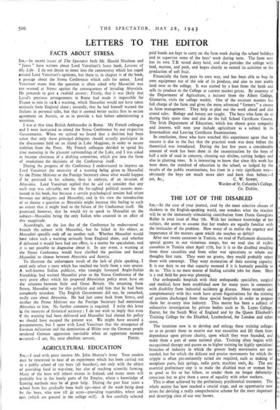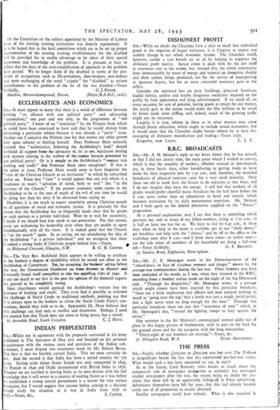THE LOT OF THE DISABLED
Stn,—In the case of your journal, read by the most selective classes of thinkers in the English-speaking world, one wonders what the reaction will be to the immensely stimulating contribution from Dame Georgiana Buller in your issue of May 7th. With her intimate knowledge of her subject, she seems to assume that her readers are equally familiar with the intricacies of the problem. How many of us realise the urgency and importance of the matters upon which she touches so deftly?
After our recent successes in Tunisia, we read of Parliament discussing special grants to out victorious troops, but we read also of io,800 casualties in Tunisia since April 17th, but it is to the disabled resulting from these casualties and from other war operations to whom our thoughts first turn. They want no grants, they would probably reject them with contempt. They wanr restoration of their earning capacity. It is our duty to see that capacity restored if it is humanly possible to do so. This is no mere matter of finding suitable jobs for them. Here is a real field for post-war planning.
Our orthopaedic hospitals with their orthopaedic specialists, surgical and medical, have been established now for man. y years in connexion with disability from industrial accidents ig disease. More recently and complementary with this work have arisen drganisations for the training of patients discharged from these special hospitals in order to prepare them for re-entry into industry. This matter has been a subject of exhaustive investigation by private bodies such' as St. Loyes College, Exeter, for the South West of England and by the Queen Elizabeth's Training College for the Disabled, Leatherhead, for London and other areas.
The intention now is to develop and enlarge these training colleges so as to permit them to receive our war casualties and lift them from dependence upon private charity, upon which they were founded, and make them a part of some national plan. Training often begins with occupational therapy and passes on to higher training for highly specialised branches of industry in which the grosser body movements are not needed, but for which the delicate and precise movements for which the cripple is often pre-eminently suited are required, such as making of aeroplane parts, hair springs, radio parts, machine tools, &c. The one essential preliminary step is to make the disabled man or woman feel as • good as his or her fellow, to render them no longer deformity- conscious but to give them a sense of equality with other workers.
This is often achieved by the preliminary psychiatrical treatment. The whole matter has 'now reached a crucial stage, and an opportunity now arises for devising a really comprehensive scheme for the most important and deserving class of our war heroes. On the Committee on the subject appointed by the Minister of Labour ne of the existing training institutions was directly represented. It
:o be hoped that in the local committees which are to be set up proper representation of the existing training establishments for the disabled will be provided for to enable advantage to be taken of their special experience and knowledge of the problem. It is pleasant at least to reflect that the days of the over-simplification of approach to the problem have passed. We no longer think of the disabled in terms of the pro- vision of occupations such as lift-attendants, door-keepers, mat-makers and mere exchanging of the word " cripple" for " disabled " as serious contributions to the problem of the lot of the war disabled.—Yours
Mardon, Moretonhampstead, Devon. (Major, R.A.M.C., recd.).



























 Previous page
Previous page